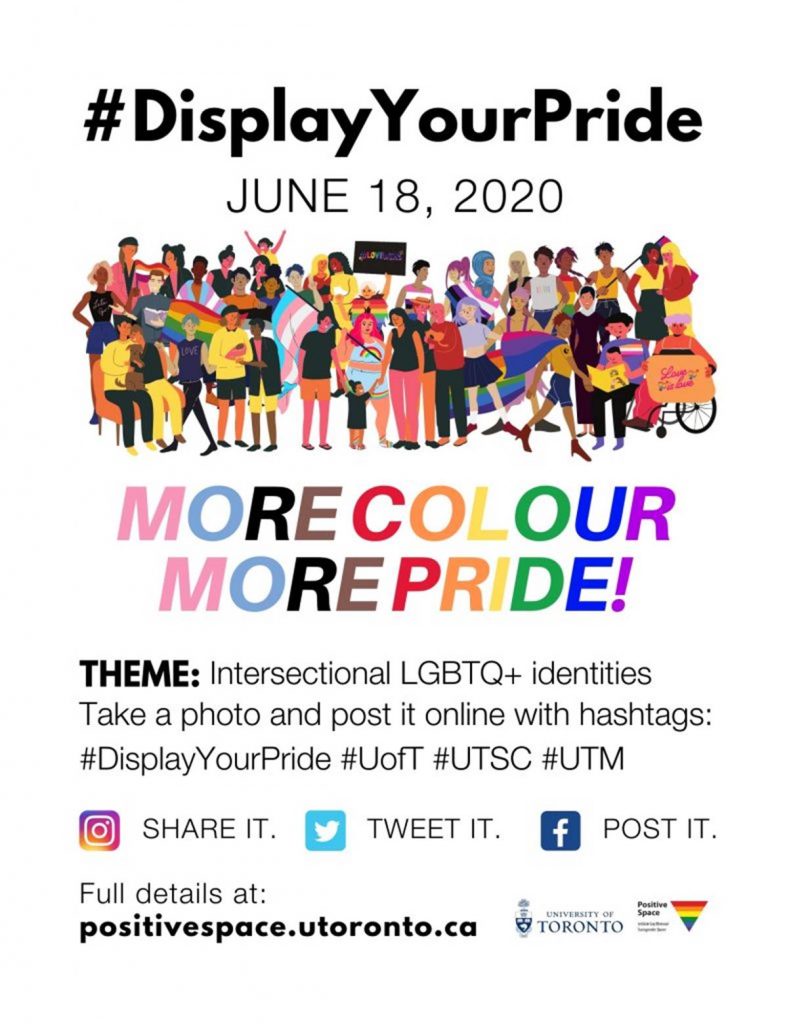Written by Terri-Lynn Langdon and Kaitlyn Corlett

Happy Pride Month, 2020! From all of us at the Innovation Hub, let’s celebrate love and affirmation for everybody. This is especially important in a time where many of us may feel disconnected from our communities, spaces, and activities that ground us for celebrating this important time of year. At the Innovation Hub, we often celebrate #DisplayYourPride in a collaborative activity to connect with one another and express how we are celebrating. Since we can’t connect in-person this year, we are celebrating by acknowledging the important history of Pride and inviting readers to think about how to celebrate in a commitment to anti-racism and intersectionality. We are centering the lives of Black LGBTQ2SIA+1 folx2, who continue to be catalysts for significant change in the LGBTQ2SIA+ movement.
We wish to show our pride as a part of the University of Toronto Community by centering the history of Black queer3 and trans-identified folx who catalyzed LGBTQ2SIA+ movements in the 1969 Stonewall Uprising, from which Pride Parades in the United States and Canada grew.4 It’s also important to acknowledge that less than fifty years ago, LGBTQ2SIA+ activists in Canada were focused on the decriminalization of the everyday lives of queer folx. While incredible steps have been made, there are still many spaces and existing systemic constructs that significantly impact LGBTQ2SIA+ lives, and BIPOC5 individuals and communities.
In the years since the Stonewall Uprising and many other movements, research still shows that Black LGBTQ2SIA+ communities and Transgender folx experience more barriers to inclusion in political, social, economic and LGBTQ2SIA+ spaces and movements. It’s integral that we continue to acknowledge this and work towards intersectional spaces that truly allow for full recognition and celebration of these communities.
Due to COVID-19 and physical distancing, there are also many barriers to navigate to find meaningful connection and support. These conditions can make it challenging for LGBTQ2SIA+ students to connect, whether it be individuals’ living environments or resources that are available. In these precarious times, it’s more important than ever to understand how privacy and acceptance are not always within reach, even in an online context. Also, not all are accepting of LGBTQ2SIA+ identities and cultures. As we celebrate Pride, we must engage in resources, connect with one another, and find ways to support LGBTQ2SIA+ communities and individuals. We must center this further by supporting Black spaces and anti-racist resources and practices, so that celebrating Pride means truly celebrating intersectional identities, lives, and individuals
Here are some of the things our team members are doing this Pride Month!
“I have been inspired by the original purpose of Pride as a movement to push for acceptance and have been posting a lot of anti-racist resources on social media and helping my friends find educational resources and places to donate. Oppression is intersectional and anyone with any sort of voice has the power to make a difference.”
– Sharon Allman, iSchool Practicum Team Member, The Students with Disabilities Project
“I’m going to celebrate Pride month by focusing on educating myself to know the history of Pride, a movement enriched by the Stonewall uprising in 1969 in New York. As a UX designer, I would like to educate myself to design better and more inclusive experiences. Many people rarely identify with the images or illustrations on various mobile apps, websites and social media. I believe that this needs to change. This is how I plan to contribute to the creation of an LGBTQ2SIA+ inclusive digital environment, not only this month but for the rest of my life.”
– Vatsal Bushan, Stories from a Distance Project Member
These are some of the many ways our team has been inspired to celebrate Pride and it’s history this month, and beyond! As we celebrate this, please know that our webspace’s and projects aim to be safer and braver spaces for LGBTQ2SIA+, Black, Indigenous, People of Colour, and Queer students. We have a vision for every student in the U of T community to feel safe, accepted, and heard. Please come as you are and reach out to these community resources if you need to connect.
Resources available:
These are some of the many resources we invite you to connect with to see how the University of Toronto community is celebrating.
- For more information on #DisplayYourPride and to join in: https://positivespace.utoronto.ca/display-your-pride/
- To view the University of Toronto’s trip-campus flag raising and more resources the University is providing: https://www.utoronto.ca/news/pride-2020-u-t-raise-flags-all-three-campuses?utm_source=The+Bulletin+Brief&utm_campaign=b499fa6544-EMAIL_CAMPAIGN_2018_06_13_COPY_01&utm_medium=email&utm_term=0_b5083c0488-b499fa6544-110251915
- To access the UofT Pride Calendar: uoft.me/UofTPride
- For more LGBTQ2SIA+ resources: https://www.utoronto.ca/news/get-know-lgbtq-resources-u-t
Additional Notes:
Below are terms and acknowledgements for some of the highlighted content in this post:
- LGBTQ2SIA+ – This acronym stands for Lesbian, Gay, Bisexual, Trans, Queer, two-spirit, Intersexed, Asexual and + is for anywhere on this spectrum and intersections along that spectrum.
- This term is a gender-neutral way to refer to everyone and acknowledge the significance of the LGBTQ2SIA plus communities.
- While the word “queer” is not unproblematic in its history, it is widely accepted within university contexts as an umbrella term for all identities that deviate from heterosexual and cisgender norms. We recognize that many LGBTQ+ individuals are not comfortable with the term, but we support the efforts of the university’s queer community to reclaim the term.
- This term is a gender-neutral way to refer to everyone and acknowledge the significance of the LGBTQ2SIA plus communities.
- BIPOC: This term stands for Black, Indigenous and People of Colour. We recognize that this general term to acknowledge these groups. In anti-racist and intersectional dialogues we must also acknowledge specific groups, races, and identities to ensure that anti-racist dialogues are not generalized.
0 comments on “#DisplayYourPride 2020: Celebrating Pride and Intersectionality at the Innovation Hub”